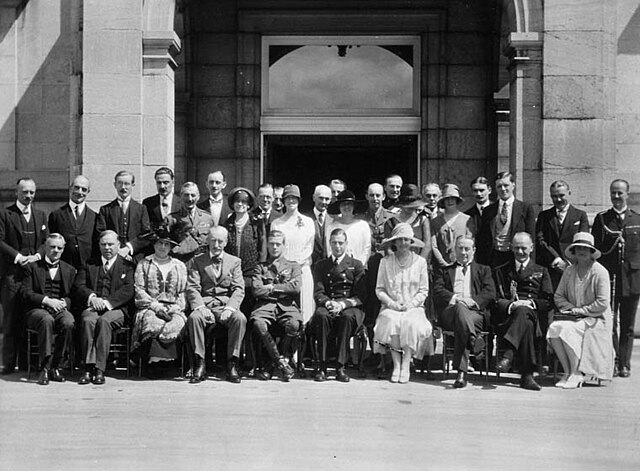Sir Robert Laird Borden was a Canadian lawyer and politician who served as the eighth prime minister of Canada from 1911 to 1920. He is best known for his leadership of Canada during World War I.
Borden in 1918
Borden, 1901
Sir Robert and Lady Borden, 1912
Borden opening a Victory Bond campaign in Toronto, 1915
King's Privy Council for Canada
The King's Privy Council for Canada, sometimes called His Majesty's Privy Council for Canada or simply the Privy Council (PC), is the full group of personal consultants to the monarch of Canada on state and constitutional affairs. Practically, the tenets of responsible government require the sovereign or his viceroy, the governor general of Canada, to almost always follow only that advice tendered by the Cabinet: a committee within the Privy Council composed usually of elected members of Parliament. Those summoned to the KPC are appointed for life by the governor general on the advice of the prime minister of Canada, meaning that the group is composed predominantly of former Cabinet ministers, with some others having been inducted as an honorary gesture. Those in the council are accorded the use of an honorific style and post-nominal letters, as well as various signifiers of precedence.
The Office of the Prime Minister and Privy Council building is the seat of the Privy Council
Andrew Scheer, then leader of the opposition, being sworn into the Privy Council at Rideau Hall in 2017
Prince Edward (front row, fifth from left), at Rideau Hall, in Ottawa, two days after being appointed to the King's Privy Council for Canada
The first meeting of the Privy Council before the reigning sovereign; in the State Dining Room of Rideau Hall. Queen Elizabeth II is seated at centre, with Prince Philip, Duke of Edinburgh, to her left, and Prime Minister John Diefenbaker at her right; 14 October 1957.








